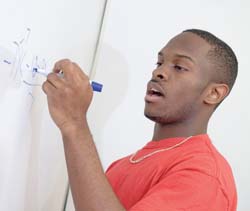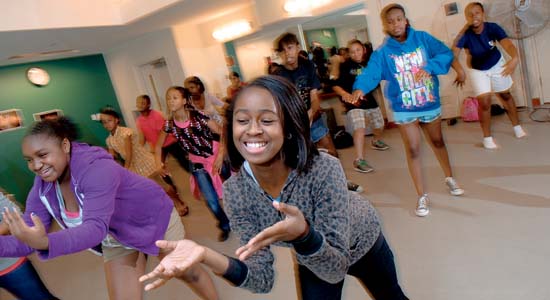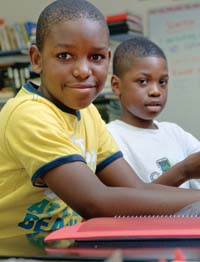 |
 |
| current issue |  |
past issues |  |
send a letter/news |  |
address update |  |
advertise |  |
about us |  |
alumni home |
Features
The Rebound TeamPage 3 of 4
 Lisa Nugent/UNH Photographic Services
Lisa Nugent/UNH Photographic ServicesCarlfred Malcolm, 16, has been a participant in Project RISE for the past four years. He's also a mentor with the project's youth leadership team. |
The hardest thing about his new path, recalls Taylor, was coming to grips with what he had to leave behind—old friends, old habits, a familiar world. Dixon is an expert at coaching kids through the painful process of letting go of their past. "My job is to push, to help them understand that it's OK to fall down as long as you realize you can get up and keep going," he says. "I ask them, why take the risk of selling drugs and getting shot and killed, when you could just hurt your pride instead? There are no coffins involved with getting your pride damaged."
Sometimes the transformation in Project RISE students is immediate. "It didn't take long before Dale started asking for homework," Dixon recalls. But the real proof of the power of the program is often confirmed years later. Today, two decades after his first Project RISE summer, Taylor has an undergraduate degree in business from Siena College, where he works as an assistant director of admissions. He owns a home and is pursuing an M.B.A. from Sage College of Albany. "If I hadn't found Project RISE, I'd be dead or in jail," says Taylor, remembering the friend who called from jail—and was later murdered on a street corner. "I wish," says Taylor, his voice quiet, "that he could have had the same chance that I did."
ON A MID-JULY DAY, a sixth-grade Project RISE science class is outside in the hot sun attempting to set marshmallows on fire with their solar cookers—or at least toast them. The teacher talks about condensation with one student, reminds another to record his observations, and sparks cheers when she announces that they'll make s'mores with the gooey results of their experiments. Later, in math class, everyone is hunched over, doing calculations and taking turns at the blackboard. A few kids needle the teacher: they want another candy problem—a wildly popular competition that awards a candy bar to the group who does the quickest calculations. In English class, the computer lab is quiet except for the sound of clicking keys. Students title their pieces with names like "My Nightmare" or "Death and the True Meaning of Life." One girl is working on a story about stab wounds.
 Lisa Nugent/UNH Photographic Services
Lisa Nugent/UNH Photographic Services |
In nearly every classroom, counselors circulate, providing one-on-one tutoring. Each counselor is an example of a real-life success story. Isabel Lorenzo was sent to Project RISE as punishment by her mother. She had no interest in academics and even less in going to college. "My grades were terrible, especially in math," she says. "But Project RISE made me love math—and made me good at it." Today, Lorenzo is an economics major at Howard University and, like many in the program, is the first in her family to attend college. She returns every summer to work as a counselor.
 Lisa Nugent/UNH Photographic Services
Lisa Nugent/UNH Photographic Services |
Math teacher Billy O'Dwyer Jr., of candy problem fame, says the combination of counselors who, like Lorenzo, aren't much older than the students, positive peer pressure and high-energy teaching gets students to sit up and pay attention and also taps their innate desire to prove themselves. Dixon puts so much faith in his staff, according to O'Dwyer, that they want to excel, too. "It's not just at-risk kids whom he reaches," says O'Dwyer (son of former Boston Bruins player Billy O'Dwyer), who had Dixon as an economics teacher and basketball coach at Thayer. "He's proof of what can be achieved by incredibly hard work. He leads by example."
History teacher Napoleon Lherisson sometimes has a sense of deja vu, recalling that just eight years ago, he was a student himself. When he started in the program as a ninth grader, Lherisson was reading at a fifth-grade level. His math skills were equally poor. "Ironically, he'd been on the honor roll for three years," says Dixon, describing a problem he sees often—students caught in an overloaded system, who, as long as they're not acting up, get passed from one grade to the next. "We took a chance on him," says Dixon, whose hunch paid off. "He worked so hard," he adds, "that he inspired others to believe in him, too."
Today Lherisson, who attended Thayer and then Brandeis, is Dixon's colleague during the school year, teaching history at Thayer on a two-year teaching fellowship. His subject is African-American history. "I want to expose these kids to new ideas, to tell them to always seek the truth," he says. "I hope they'll get a deeper understanding of who they are."
Page: 1 2 3 4 Next >
Easy to print version
blog comments powered by Disqus

